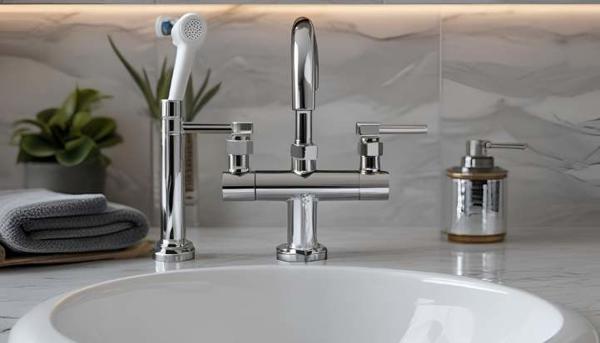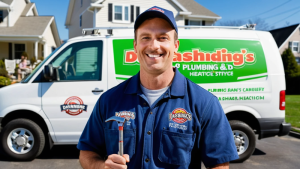
How to Reduce Utility Bills with Plumbing Upgrades that boost comfort, save water, and increase property value with smart, affordable solutions.
Upgrading your home’s plumbing system is one of the smartest ways to reduce monthly utility costs, improve comfort, and increase long-term property value. Modern plumbing solutions not only conserve water and energy but also enhance performance and reliability for your entire household.
Whether you’re replacing outdated fixtures or investing in advanced water-heating technologies, these improvements deliver both immediate savings and long-term peace of mind. For expert guidance and professional installation, you can always rely on RJP Plumbing & Heating to ensure every upgrade is done right.
Upgrade Fixtures and Fittings
Low-Flow Showerheads and Faucet Aerators
Replacing standard showerheads with low-flow models (1.5–2.0 GPM) and adding faucet aerators (0.5–1.5 GPM) can reduce water use by up to 50%—without sacrificing pressure or comfort. This simple swap pays for itself in just a few months through lower water and energy bills.
High-Efficiency Toilets
Older toilets can use up to 5 gallons per flush, while high-efficiency or dual-flush models typically use less than 1.3 gallons. By upgrading, the average family of four can save more than 13,000 gallons of water per year.
Choose the Right Water Heater
Tankless and Heat-Pump Options
- Tankless water heaters provide hot water on demand, eliminating standby energy losses. They’re ideal for households with staggered usage.
- Heat-pump water heaters are among the most efficient options available, using up to 60% less electricity than standard electric resistance heaters.
Temperature Settings and Insulation
Setting your water heater to around 120°F strikes the right balance between safety and energy efficiency. Adding insulation to tanks and exposed hot water pipes further minimizes heat loss and reduces operating costs.
Adopt On-Demand Hot Water Solutions
Waiting for hot water at sinks or showers wastes both time and resources. Installing demand-controlled recirculation systems or point-of-use mini-tanks ensures hot water is delivered almost instantly.
Smart features such as timers, motion sensors, or temperature sensors allow these systems to operate only when necessary, preventing wasted energy and unnecessary wear.
Install Smart Leak Detection and Shutoff Devices
Water leaks not only waste resources but also cause costly property damage if left undetected. Installing smart leak detection sensors and automatic shutoff valves provides real-time alerts and immediate protection.
Homeowners should also regularly check for:
- Dripping faucets
- Running toilets
- Damp spots under sinks
- Moisture behind appliances
By addressing small leaks early, you prevent larger repairs and avoid unnecessary heating costs from wasted hot water.
Reuse and Harvest Water (Where Allowed)
Water reuse and collection systems help reduce reliance on municipal water supplies while lowering monthly costs.
- Greywater systems redirect gently used water from laundry for landscape irrigation.
- Rainwater harvesting systems capture roof runoff for outdoor watering, car washing, and other non-potable uses.
Always confirm compliance with local codes, and ensure you work with certified systems and installers to protect safety and property value.
Optimize System Controls and Maintenance
Smarter System Components
- Pressure-reducing valves prevent excessive water flow that leads to waste.
- ECM circulation pumps dramatically cut electrical consumption while improving performance.
- Thermostatic mixing valves allow water to be stored at higher, safer temperatures while still delivering cooler water at faucets.
Ongoing Maintenance
Routine maintenance keeps plumbing systems efficient and reliable. Tasks such as flushing water heater tanks, removing sediment, and servicing valves and pumps extend equipment lifespan and prevent costly breakdowns.
Start Small, Then Scale Up
The best approach to plumbing upgrades is incremental. Begin with low-cost changes like installing aerators, insulating pipes, and adjusting water heater settings. As your budget allows, invest in larger upgrades such as heat-pump water heaters, greywater systems, or demand-controlled circulation systems.
Many local utilities and municipalities offer rebates, tax incentives, and financing programs for energy-efficient plumbing improvements—further reducing payback times and increasing affordability.
For reliable installation and personalized recommendations tailored to your home, trust the professionals at RJP Plumbing & Heating. Their expert team ensures every upgrade is done efficiently, safely, and up to code. You can also explore their affordable plumbing services to see why so many homeowners choose them for plumbing and heating solutions.
FAQs: Reduce Utility Bills
How can plumbing upgrades lower my water bill?
Upgrades like low-flow showerheads and high-efficiency toilets use less water. They save thousands of gallons a year. This means lower water and energy bills over time.
Are tankless water heaters worth the cost?
Yes, tankless heaters give hot water when you need it. They save energy by not wasting it when not in use. They’re great for homes with different water needs. The savings can be more than the cost.
What temperature should I set my water heater to?
Set your water heater to 120°F for safety and efficiency. It’s comfortable too. Adding insulation to tanks and pipes helps save even more energy.
How do smart leak detectors save money?
Smart leak detectors find leaks early, preventing big damage. They also stop wasted hot water from leaks. This cuts down on repair costs and your monthly bill.
What is the easiest first plumbing upgrade to try?
Begin with simple, cheap fixes like faucet aerators and showerheads. Insulating pipes is also easy. These small changes can make a big difference. You can always do more later.


